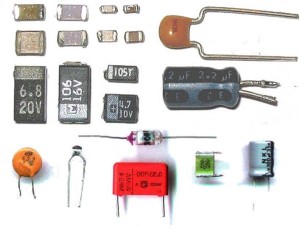For your work, choosing a suitable capacitor is an important aspect because every capacitor is different in some aspect from each other. In some instances, one form of the capacitor may work well in one circuit while it will cause problems in another circuit because of its suitability. Here we are going to explain you some factors which will be necessary to keep in mind before choosing a capacitor for your work.
Factors associated with capacitors choice
Before choosing any capacitor for your work always look over these factors explained below:
(i) Temperature coefficient:
It is of two types one is Positive and other is Negative. If resistance or any other component got increased with increase in temperature then it is known as positive temperature coefficient while if resistance or any other component got decrease with increase in temperature then it is known as negative temperature coefficient. Similarly, some capacitors vary more with temperature while other varies little. Like Silver mica or some form of ceramic vary little with temperature and are therefore suitable for applications in oscillators and filters.
(ii) Cost:
In many applications, cost plays a vital role because it varies from the capacitor to capacitor depending upon its dielectric material. Like much high-performance capacitors, can be obtained for relatively low cost in surface mount packages. Standard Silver mica, glass and other specialised capacitors can be very costly used only in big physical laboratories because they are required only for special purposes.
(iii) Polarisation:
Capacitors have positive and negative polarity shown on their body are considered as polarized capacitors. Like electrolytic and tantalum capacitors are polarised and can operate only when voltage is applied across its one terminal. These are unidirectional in nature i.e. operate with a voltage in one direction across them. If you want another type of capacitor which can operate with a voltage in either direction you can make the best choice of yours as per your requirement.
(iv) Value range available:
Capacitors are available in several ranges and this often limits the capacitor choice. If you are going to select any capacitor always remember or enquire availability of the range of that capacitor. Ranges available may guide you to choose a particular type of capacitor for a particular application.
(v) Leakage current:
Leakage is the most adverse factor in capacitors because it adversely affects the performance of the circuit. In some applications, high level of insulation is required across the capacitor due to circuit sensitivity. So before choosing capacitor always recommended considering this factor.
(vi) Working voltage:
Another major factor determining the capacitor choice and application is the working voltage. Like tantalum capacitors are available in lower voltages while ceramic capacitors are available in higher voltages. So it’s up to your requirement you can choose any of the capacitors according to its working voltage range availability.
(vii) Tolerance:
It is also an important factor to be considered before choosing any capacitor. In some circuits and applications such as filters and oscillators, the value of the capacitor may be critical, for these applications close tolerance capacitors may need to be chosen.
Want to know more about capacitors then follow these links below:
Capacitor construction and working
Applications of capacitors:
Capacitors are a passive device used to store electric charge. As all we know, one type of capacitors is not suitable for all applications, we have to select different capacitors for different work according to their dielectric material and usage. Following of capacitors applications are:
(i) Capacitor as a filter: Capacitor is the main element of the filter because it’s reactance is inversely proportional to the frequency used to increase or decrease the impedance of the circuit at certain frequencies. Due to this application it performs filtration job in many electronic circuits.
(ii) Dc blocking: It reduces ripples in any circuit by blocking Dc current and allows the Ac to pass at a certain portion of the circuit.
(iii) Bypass capacitor: In certain applications it is used in parallel with other components to bypass it at a specified frequency because its reactance decreases as the frequency increases.
(iv) Coupling & Decoupling: It acts as a coupling device because it passes Ac signal and couples one section of the circuit to the other section. Decoupling capacitor minimizes the noise and disturbances to the logic signal because it is located very close to the IC output and serves as a local energy source to provide the needed extra current.
(v) Snubber capacitor: It is used to limit the high voltage transient across the circuit. SCR and relays are used to drive high inductance loads but when it is open a major transient voltage could be induced in the contact of the relay or across the junction of SCR, which in turn either shows as an arc on the relay contacts or may damage the internal SCR junction. To overcome this problem, we use snubber capacitor in the electronic circuits.
(vi) Capacitor as a discharge unit: It can be used as discharge unit for ignition, triggering and power source in high scale.
Hope this article will help you in choosing right capacitor for your work. For any suggestion please comment below. We always appreciate your suggestions.


